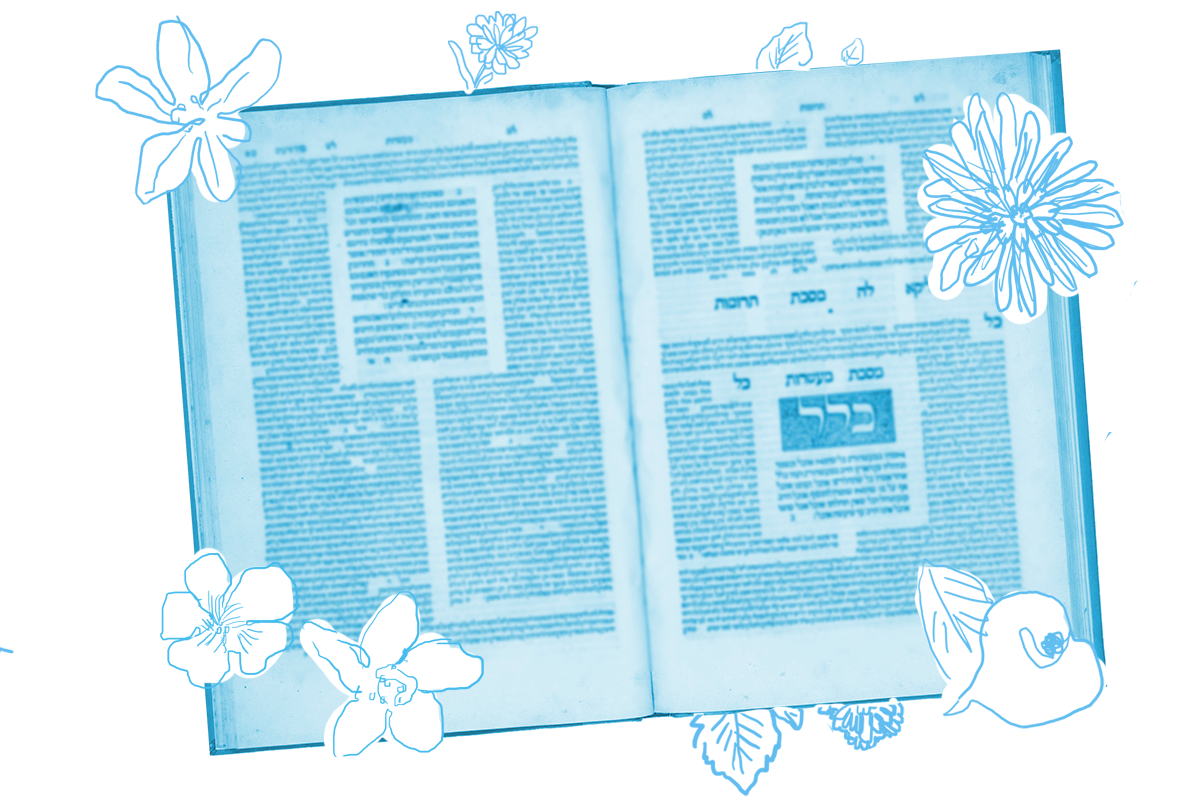Today’s daf is almost entirely devoted to a discussion of the story of Judah (one of the sons of the patriarch Jacob) and his daughter-in-law Tamar, found in Genesis 38. It’s worth reading that chapter in Genesis if you have a moment, but if not, here’s a quick reminder of how that story played out:
Tamar married Judah’s firstborn son Er, who subsequently died without children. As we learned in Tractate Yevamot, which dealt with the laws of levirate marriage, it was then the obligation of Er’s brother, Onan, to marry Tamar and raise up a son in Er’s name. Onan married Tamar, but he “let his seed go to waste” whenever he cohabited with her, so God killed him as well. Now Tamar was stuck waiting for the third brother, Shelah, to grow up and marry her. But Judah, perhaps wary of losing a third son, declined to allow the marriage to take place.
Twice widowed and with no husband on the horizon, Tamar took matters into her own hands and disguised herself as a prostitute in order to seduce Judah (the next closest relative). After the deed was done, she asked that he leave his personal staff and cord as security for future payment. Later, when her pregnancy was apparent and Judah was told of it, he assumed Tamar had “played the harlot” and angrily declared: “let her be burnt.” But, he was forced to recant when Tamar produced his staff and cord, proving that Judah was the father.
On today’s daf, the rabbis offer a homiletical reading of this story, worth exploring in full. We’ll look at a small part of it, starting here:
“She sent to her father-in-law, saying: By the man whose these are, am I with child” (Genesis 38:25).
And let her say to him (explicitly that she was impregnated by him). Rav Zutra bar Tuviyya says that Rav says, and some say Rav Hana bar Bizna says that Rabbi Shimon Hasida says, and some say that Rabbi Yohanan says in the name of Rabbi Shimon ben Yohai: It is more amenable for a person to throw himself into a fiery furnace and not humiliate another in public. From where do we derive this? From Tamar.
Tamar could have just announced Judah as the father of her children. (Surprise! It’s twins). Instead, she brings out Judah’s pledge items and waits for them to be recognized. The practical advantage is obvious: These tangible items provide stronger proof than a verbal claim. But the rabbis find something else laudable in her behavior: It delivers the news to Judah slowly enough to spare him immediate humiliation.
Indeed, as we can see from the biblical text, Tamar chooses her words very carefully:
“And she said: Discern, please, whose are these, the signet, and the cords, and the staff” (Genesis 38:25).
Rabbi Hama, son of Rabbi Hanina, says: With the use of the word discern Judah informed his father that Joseph was lost, and also with use of the word discern they informed Judah about the signs.
The word haker means to recognize or discern. Long before his encounter with Tamar, Judah was one of the brothers who dipped Joseph’s multicolored coat in animal blood and brought it to their father Jacob, to give him the (wrong) impression that his favorite son had been mauled to death by a wild beast. In a clever turn of phrase, Tamar uses the same word of discernment to remind Judah of his own responsibility as it dawns on him that he is the father of her twins. This, the rabbis tell us, puts Judah in the frame of mind to act, and to do the right thing:
“And Judah acknowledged them and said: She is more righteous than I; forasmuch as I gave her not to Shelah my son.” (Genesis 38:26)
There’s a lot more on the daf, so you’re invited to go check it out. And why are the rabbis offering this extended interpretation of the Judah and Tamar story? Because, they explain, it is told to the sotah. She is meant to learn from this episode that by admitting his guilt, Judah merited to be the progenitor of kings (one of Tamar’s sons becomes the ancestor of King David). Likewise, they hope that she will choose to admit her guilt rather than submit to the ordeal.
But in this reading of the story, the rabbis also lavish stunning praise on Tamar — who so cleverly found a way to raise up seed for her dead husband and prove her innocence, all while sparing Judah unnecessary humiliation. This is in notably stark contrast to the sotah, who is forced to undergo trial by ordeal and terrible humiliation for maintaining hers.
Read all of Sotah 10 on Sefaria.
This piece originally appeared in a My Jewish Learning Daf Yomi email newsletter sent on April 7th, 2023. If you are interested in receiving the newsletter, sign up here.
The post Sotah 10 appeared first on My Jewish Learning.




